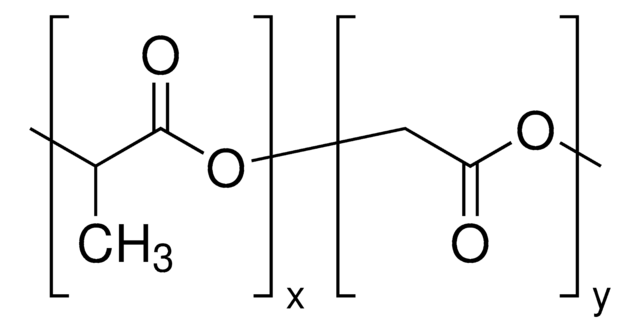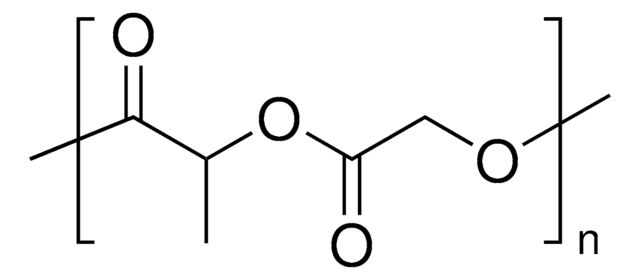922692
Poly(lactide-alt-glycolide)
average Mn 20,000, 50:50 (lactide:glycolide)
Iniciar sesiónpara Ver la Fijación de precios por contrato y de la organización
About This Item
Fórmula lineal:
(C5H6O4)n
UNSPSC Code:
12162002
NACRES:
NA.23
Productos recomendados
form
powder
Quality Level
feed ratio
50:50 (lactide:glycolide)
mol wt
average Mn 20,000
color
white to beige
storage temp.
2-8°C
¿Está buscando productos similares? Visita Guía de comparación de productos
Application
Different from common Poly(lactide-co-glycolide) (PLGA) polymer, the lactic and glycolic units in Poly(lactide-alt-glycolide) alternate in sequence in the polymer chain, and the molar ratio of lactic to glycolic units in the polymer is exactly 1:1. Poly(lactide-alt-glycolide) exhibits excellent solubility in common organic solvents, such as acetonitrile, acetone, dioxane, DCM, and THF, providing great convenience for drug delivery researches and applications.
Common Poly(lactide-co-glycolide) (PLGA) is a biocompatible and biodegradable polymer that has been approved by the FDA for biomedical and pharmaceutical applications. PLGA based polymers are usually synthesized from copolymerization of glycolide (GA) and lactide (LA). However, the copolymerization of glycolide (GA) and Lactide (LA) typically results in broad composition ranges and a random block nature because of the much higher reactivity of GA and the drastic polymerization conditions. Thus, simple use of equimolar charges of GA and LA results in polymers containing longer glycolic blocks leads to poor solubility in common solvents.
Common Poly(lactide-co-glycolide) (PLGA) is a biocompatible and biodegradable polymer that has been approved by the FDA for biomedical and pharmaceutical applications. PLGA based polymers are usually synthesized from copolymerization of glycolide (GA) and lactide (LA). However, the copolymerization of glycolide (GA) and Lactide (LA) typically results in broad composition ranges and a random block nature because of the much higher reactivity of GA and the drastic polymerization conditions. Thus, simple use of equimolar charges of GA and LA results in polymers containing longer glycolic blocks leads to poor solubility in common solvents.
Storage Class
11 - Combustible Solids
wgk_germany
WGK 3
flash_point_f
Not applicable
flash_point_c
Not applicable
Certificados de análisis (COA)
Busque Certificados de análisis (COA) introduciendo el número de lote del producto. Los números de lote se encuentran en la etiqueta del producto después de las palabras «Lot» o «Batch»
¿Ya tiene este producto?
Encuentre la documentación para los productos que ha comprado recientemente en la Biblioteca de documentos.
Synthesis of poly(D,L-lactic acid-alt-glycolic acid) from D,L-3-methylglycolide
Dong C M, et al.
Journal of Polymer Science Part A: Polymer Chemistry, 38, 4179-4179 (2000)
Lin Yu et al.
Biomacromolecules, 12(4), 1290-1297 (2011-03-03)
This paper reports the influence of sequence structures of block copolymers composed of poly(lactic acid-co-glycolic acid) (PLGA) and poly(ethylene glycol) (PEG) on their thermogelling aqueous behaviors. A series of thermogelling PLGA-PEG-PLGA triblock copolymers with similar chemical compositions and block lengths
Nuestro equipo de científicos tiene experiencia en todas las áreas de investigación: Ciencias de la vida, Ciencia de los materiales, Síntesis química, Cromatografía, Analítica y muchas otras.
Póngase en contacto con el Servicio técnico






